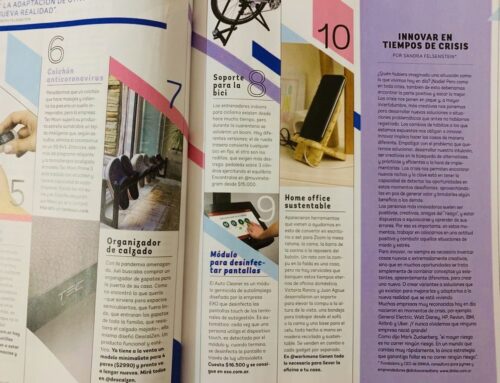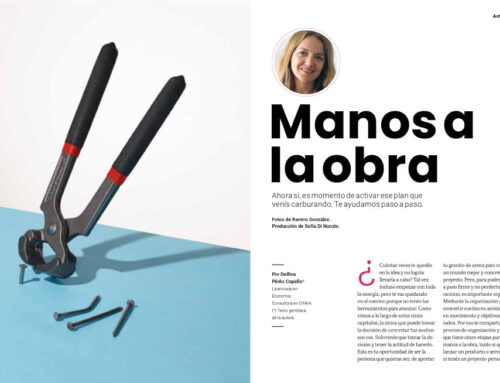One thing leads to the other. Given the first step, the doors of opportunities begin to appear at different points that guide the action of, for example, the owner of an SME. Starting from this thought, Sandra Felsenstein, director in Dinkka, a consultant dedicated to the advice of small and medium enterprises, after speaking, in a first part with multitaskers about the importance of delegating, offers a look on how the empowerment of employees, that is, the increase in personal abilities, leads to a great team work that causes, in the company, a greater capacity to innovate.
Felsenstein, in addition to having advice, has a postgraduate degree in strategic marketing (UB) and business specialization courses such as Think Different (IAE), Creative Lab (IAE), Foreign Trade (Bankboston Foundation), TPM and Lean (J & J), among others. On the other hand, it has a vast work experience in companies such as Compass Group Argentina, Johnson & Johnson and was a consultant in process reengineering projects in various multinational companies such as Techint and Quinsa (Quilmes, Pepsi). He is also the representative in Argentina of the Spanish Global Spanish Consultant BICG, for whom he led projects of new forms of work in companies such as Repsol YPF. He also worked as a teacher at the UBA and the UP.
Next, the interview with the specialist who, based on his personal experience, tells this time that SMEs can strengthen not only the intellectual abilities of their staff, but also to create and maintain an effective level of their team that enhances, in the long run, the innovation of the company:
How important is to have a good work team?
There is a phrase that I really like "if you give a good idea to a mediocre team, they will spoil it; if you give a mediocre idea to a great team, they will improve it or discard it and they will create something that does work." For me the team represents a very important portion of the success of a company.
How can employee empowerment be increased?
At present, it tends not to talk about “employee” but the term of “collaborator” is used. To achieve more innovative companies, greater satisfaction of collaborators and as a consequence better results, it seeks to obtain empowerment in employees. In fact, workers do not value remuneration in money exclusively, but give enormous importance to the satisfaction of belonging to a work team within which to be able to perform in a free and flexible way, with a clear mission, in an area that allows to express themselves and be heard and a clear perspective of the future within the organization.
What requires a team to be effective?
Every work team is a company that markets products or services, requires very clear and known objectives in depth by all its members. That is why excellent internal communication is essential in terms of the objectives to be met and the strategies to be used. To maintain a motivated team, it is also important to participate in the advances and achievements that are achieved, both individually and from the group in their joint action. This allows us, to a greater or lesser extent from the old control processes "for tasks" to move on to the control "by objectives", which generates empowerment towards the company or organization, achieving greater commitment and better results.
What role does leadership fulfill? Is it the main thing in the teams?
While all teamwork requires a clearly present leadership that guides its operation, it is also very important that members individually have their space to express their personal ideas and suggestions and make their contributions to the general project. This is the paradigm change of the "traditional boss" to the "current leader" and thus a committed and permanently motivated team will be maintained.
In December 2007 they obtained the mention by the Clarín newspaper as “one of the ten most innovative projects in Argentina of the year” how can a company promote innovation?
Forming interdisciplinary teams is the main raw material to innovate. Each of us unfailingly brings pre-concepts and if we do not exchange ideas and opinions with people of different training and background, we will always arrive at the same responses, conclusions and solutions. Therefore, once again, the work team is essential to innovate. Likewise, we must encourage exchange, creating spaces for this practice, for example, through “suggestion channels” or interactive meetings, in which everyone can present creative and innovative ideas.
Particularly in your company, what kind of actions do they carry out to foster it?
In Dinkka we have guidelines of meeting, in which we propose themes or problems to the table and dedicate ourselves to make rain of ideas based on these issues. The important thing is that these spaces are "scheduled" periodically, have a delimited time, and that from these meetings conclusions that derive in actions, etc. In the course of the meetings there must be “divergent” creation moments, during which everyone must contribute ideas without filters (brainstorming), and then concentrate on the most viable and more likely to specify ideas.
On the other hand, you have to know how to listen to everyone. You never know where the best ideas can arise, so you have to be receptive and permeable. To create innovative companies, the most important thing is to risk, bet, be willing to leave the comfort zone, because otherwise we will make sure to do things "well" in the "known way" but we also make sure we will never be innovating.
Mariano Ylarri








